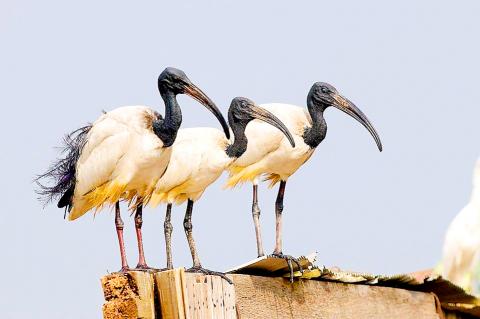The number of nests built by the invasive African sacred ibis in Changhua’s Hanbao Wetlands (漢寶濕地) has nearly tripled over the past two years, despite efforts to eradicate them, an environmentalist said.
Aerial photographs showed 800 nests in the wetlands, up from 300 two years ago, Taiwan Environmental Protection Union Changhua Division director-general Tsai Chia-yang (蔡嘉陽) said.
“The government needs a strong plan of action to deal with this,” Tsai said.

Photo courtesy of the Chinese Wild Bird Federation
The bird symbolizes wisdom in Egyptian culture, but in Europe it has been labeled as one of the 100 worst invasive animal species.
The ibis entered the wild in Taiwan 34 years ago after an enclosure at a zoo in northern Taiwan broke open in a typhoon.
The Chinese Wild Bird Federation estimates that there are 2,500 to 3,000 of the birds in the wild, making it one of the most invasive animal species in the nation.
The birds move to different areas of Taiwan proper depending on the season, Tsai said, adding that they lay about three eggs every summer and spring.
The Hanbao Wetlands are particularly suitable for nesting, since the surrounding fish farms and fields provide an abundant source of food, he said.
Rubbing corn oil on the eggs to reduce the likelihood of hatching — a common technique for dealing with invasive birds — has proven ineffective, union vice secretary Lee I-hsin (李益鑫) said.
Removing young hatchlings from treetops has also been ineffective, as the birds are easily frightened and fly away, he said, adding that officials last year succeeded in removing only about 50 of the birds.
The US government last year began allowing US residents to hunt the species using bows, but this approach would likely not work in Taiwan, he said, adding that the use of firecrackers is also being considered.
The ibis has no natural predators in Taiwan and even though environmentalists have yet to find any evidence of it harming the local ecology, it does damage vegetation when building its nest, Lee said.
The bird also shares its habitat with local herons, meaning that it might eventually crowd them out, he added.

Alain Robert, known as the "French Spider-Man," praised Alex Honnold as exceptionally well-prepared after the US climber completed a free solo ascent of Taipei 101 yesterday. Robert said Honnold's ascent of the 508m-tall skyscraper in just more than one-and-a-half hours without using safety ropes or equipment was a remarkable achievement. "This is my life," he said in an interview conducted in French, adding that he liked the feeling of being "on the edge of danger." The 63-year-old Frenchman climbed Taipei 101 using ropes in December 2004, taking about four hours to reach the top. On a one-to-10 scale of difficulty, Robert said Taipei 101

Nipah virus infection is to be officially listed as a category 5 notifiable infectious disease in Taiwan in March, while clinical treatment guidelines are being formulated, the Centers for Disease Control (CDC) said yesterday. With Nipah infections being reported in other countries and considering its relatively high fatality rate, the centers on Jan. 16 announced that it would be listed as a notifiable infectious disease to bolster the nation’s systematic early warning system and increase public awareness, the CDC said. Bangladesh reported four fatal cases last year in separate districts, with three linked to raw date palm sap consumption, CDC Epidemic Intelligence

Two Taiwanese prosecutors were questioned by Chinese security personnel at their hotel during a trip to China’s Henan Province this month, the Mainland Affairs Council (MAC) said yesterday. The officers had personal information on the prosecutors, including “when they were assigned to their posts, their work locations and job titles,” MAC Deputy Minister and spokesman Liang Wen-chieh (梁文傑) said. On top of asking about their agencies and positions, the officers also questioned the prosecutors about the Cross-Strait Joint Crime-Fighting and Judicial Mutual Assistance Agreement, a pact that serves as the framework for Taiwan-China cooperation on combating crime and providing judicial assistance, Liang

US climber Alex Honnold left Taiwan this morning a day after completing a free-solo ascent of Taipei 101, a feat that drew cheers from onlookers and gained widespread international attention. Honnold yesterday scaled the 101-story skyscraper without a rope or safety harness. The climb — the highest urban free-solo ascent ever attempted — took just more than 90 minutes and was streamed live on Netflix. It was covered by major international news outlets including CNN, the New York Times, the Guardian and the Wall Street Journal. As Honnold prepared to leave Taiwan today, he attracted a crowd when he and his wife, Sanni,